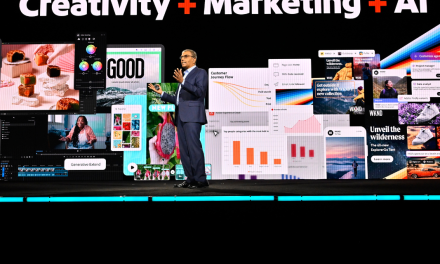Last year, we witnessed the transformational impact of artificial intelligence (AI) on an unprecedented global scale. While we eagerly embrace the potential AI brings, we also find ourselves grappling with a host of thought-provoking questions that demand thoughtful consideration of how we live in this new world of AI.
In 2022, 46% of small and medium-sized businesses (SMBs) incorporated AI to expand their workforce. For instance, Management Help LLC spends approximately $1000 to $1500 monthly on its AI tools budget. In the past, they used to pay $1800 monthly to an employee who did the same job their current AI tool handles. This shift to using AI for recruitment has saved the company money.
As a marketer, how much AI could we leverage before crossing the GDPR limits of our customer data?
As AI technologies gain momentum, marketers are presented with both powerful tools and complex ethical questions. From analyzing customer behaviors to predicting trends, AI empowers marketers to deliver personalized experiences that resonate with their target audience.
As marketers, we know that personalization is a hallmark of effective marketing using AI, but it must respect the individual’s privacy. We understand the importance of empowering customers and giving them control over what data is collected and how it’s used to enhance their sense of ownership. However, this advancement blurs the lines between utilizing data for insights and safeguarding individual privacy.
New GDPR rules
The General Data Protection Regulation (GDPR) places a strong emphasis on protecting individual privacy and giving individuals control over their personal data.
The European Commission recently published new rules to make it easier for different data protection authorities (DPAs) to work together when enforcing the GDPR in cases that involve multiple countries. The regulations aim to smoothen collaboration between data protection authorities across different countries.
For marketers implementing AI in cross-border campaigns, understanding the mechanisms for cross-border data sharing and cooperation becomes vital to navigating potential challenges and opportunities effectively. This means aligning AI strategies with data privacy, transparency, and collaboration principles to not only meet legal requirements but also build long-term customer relationships based on trust and respect for their data.
But how do we go about this when we don’t have control of what AI tools collect and generate?
I’ll leave this question hanging for you to ponder. Now, let’s talk about…
Impact of AI on customers and marketers
In June, Zoom introduced new AI-powered features that allow clients to summarize meetings without recording the entire session. These features were initially offered as a free trial. However, concerns arose regarding the original terms of service, which seemed to grant Zoom access to more user data than necessary, potentially including customer call data. Data protection specialist Robert Bateman pointed out that the initial terms allowed Zoom broad freedom to use user-generated data for various purposes.
In light of developments like the Zoom situation, do marketers need to obtain explicit user consent before collecting or using their data, especially for AI-related purposes?
In the era of information overload and data breaches, customers demand more accountability and respect for their privacy. The Zoom situation underscores that we are at a pivotal juncture where the choices we make as marketers ripple through the lives of our users.
Another example is when McDonald’s purchased Dynamic Yield in 2019, a tech company from Israel known for its AI-driven personalization software. In under two years after the acquisition, McDonald’s decided to sell it to Mastercard. During its time under McDonald’s ownership, Dynamic Yield’s revenues doubled. McDonald’s mentioned that selling the service to Mastercard will enhance its digital engagement offerings.
Ori Bauer, the CEO of Dynamic Yield, remarked that teaming up with Mastercard allows them to move away from the idea of one-size-fits-all marketing. People want experiences that are truly tailored to them, and brands that don’t adjust to this trend risk falling behind.
Ethical and proactive approaches
In the current iterations of AI adoption, there is still no full control over what AI tools collect and generate. This can be challenging, but there are steps we can take to mitigate risks and ensure compliance with data protection regulations.
-
Due diligence
One critical aspect of marketing campaign decision-making is vendor due diligence. If you’re using third-party AI tools, review their data collection, processing, and privacy practices. Choose tools that align with your data privacy requirements and provide transparency regarding the data they collect and how it’s used.
The biggest technology companies worldwide are striving to be a champion in AI adoption. Companies such as Apple, Amazon, Microsoft, Tencent, and Alibaba are leading the way in AI development. They’re using AI to create even more advanced products and services based on AI’s understanding of their massive historical data points.
When conducting vendor due diligence, this trend of major technology companies investing heavily in AI development can offer valuable insights and implications. Understanding what they focus on in AI can help assess the vendor’s positioning within the market.
Looking through the lens of vendor due diligence, it’s evident that the earlier example of McDonald’s making calculated decisions based on their assessment of Dynamic Yield’s performance and potential aligns with the evolving landscape of personalized digital experiences and their determination to make the most of their investments.
-
Customer value alignment
I know it’s easier said than done. Here’s when customer value alignment comes into play.
Eliano Marques, the Executive Vice President of Data and AI at Protegrity, a data security firm, explains that AI plays a pivotal role in expediting the data identification process to enhance customer data privacy. In scenarios where companies manage numerous databases across both cloud and on-premises environments, pinpointing the data requiring protection is far from straightforward. The intricate nature of data ecosystems makes it nearly inconceivable to envision the process of data identification without harnessing the power of automation and AI.
Balancing customer benefits and business goals when implementing responsible AI practices requires careful consideration and a strategic approach. So, I highly recommend tailoring AI-driven experiences to enhance customer value and satisfaction. When customers see the relevance and utility of your AI solutions, they’re more likely to embrace them.
-
Seek insights from anonymized data
You can use AI to glean insights from aggregated and anonymized data. This way, you can benefit from AI-driven analytics without compromising individual privacy.
You gather data from various sources, such as purchase history, website interactions, and demographic information. However, you don’t focus on individual data points. Instead, you group the data into categories like product categories, age groups, geographic regions, and purchase frequency.
Before using the data, remove any personally identifiable information (PII) that could link the data to individual customers. Now, you employ AI algorithms to analyze the data. These algorithms can identify trends, correlations, and patterns within the data. For instance, you might discover that a specific age group tends to purchase certain products during specific seasons.
With the insights gained from AI analysis, you can develop targeted marketing campaigns. For example, you might create seasonal promotions that align with the buying patterns of certain age groups without revealing any individual customer information.
TIFIN, an AI platform catering to wealth management, has unveiled a strategic partnership with Morningstar, a financial services firm, aimed at boosting its AI-driven distribution system. Through this collaboration, TIFIN AMP clients will access valuable insights extracted from Morningstar’s aggregated and anonymized advisor recommendation trends. These insights can be customized using key demographics such as region, firm size, and firm type.
The TIFIN AMP platform offers flexibility, functioning as an independent system or seamlessly integrating into a company’s existing CRM and marketing automation capabilities. This adaptable approach ensures that firms, regardless of their size, can harness and apply these wealth management-focused insights to enhance their operations.
Finding harmony between AI advancements and personal privacy in the marketing world is a challenge we must navigate. Share your thoughts by adding a comment below!



















